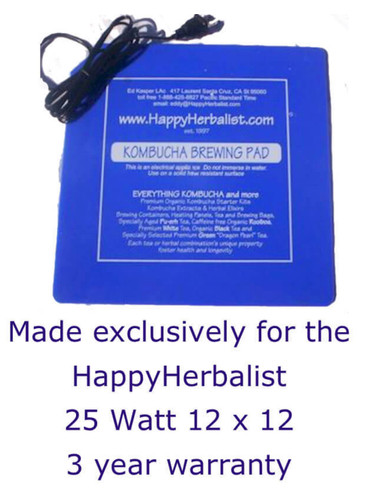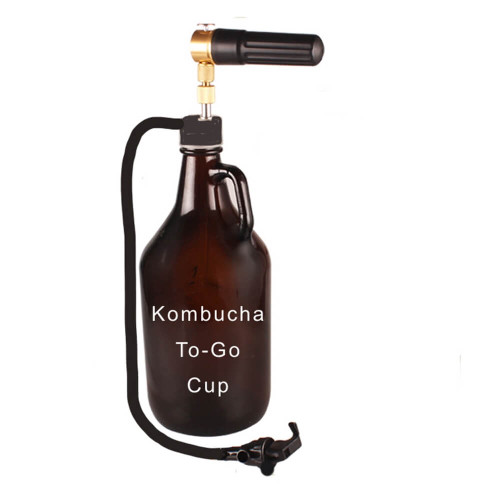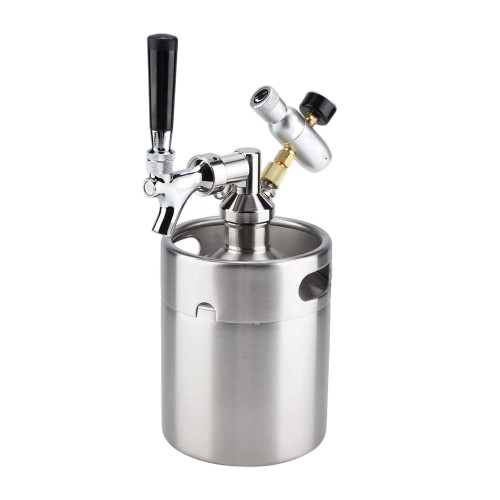Description
Quality Oak Casks. Produce the Finest Ferments.
Kombucha Tea, Ginger Beer, Japanese Water Crystals, California Bees, Tibicos, Water Kefir, Vinegar, Cider, Wine, Beer, or Whiskey or your own special brew. Everything is simply better brewed or aged in wood barrels.
Comes with cloth cover, choice of spigot, sterilizing and conditioning tablets, optional cork, wood cover, or cloth and extra large rubber band. Includes our HappyHerbalist's Continuous Brewing Guide. Full support and satisfaction guaranteed.
Barrel shown with our logo (ships without logo)
Sizes of our Barrels and Brewing Capacity.
5 liter (1 1/3 Gallon) measures 8 x 8 x 11 High. SOLD OUT
Brewing Capacity (leaving 2 inches from the top) 150 ounces (~ 1 1/5 Gal)
produces 16 - 31 ounces daily
10 liter (2 1/2 Gallon) measures 10 x 10 x 12 High
Brewing Capacity ((leaving 2 inches from the top) 288 ounces (~ 2 1/4 Gal)
produces 30- 60 ounces daily
20 liter (5 Gallon) measures 12 x 12 x 14 High
Brewing Capacity ((leaving 2 inches from the top) 448 ounces (~ 3 1/2 Gal)
produces 45-90 ounces daily
50 liter (13.2 gallons) produces 128 - 200 fluid ounces daily. Produce a Gallon or more a Day !
24 high x 19 x 19. Comes with cloth cover, wood spigot, sterilizing and conditioning kit and complete directions.
Brewing Capacity ((leaving 2 inches from the top) ferment 1,280 ounces (~ 10 Gal) that may produces One Gallon of Brew Per DAY !
Choice of Spigots
We offer your choice of Spigot:
1. Standard: Wood with Metal Inserts. Popular with our Beer and Whiskey friends. Has the look and feel of all wood, with a faster flow rate than the all wood. Free. No additional charge.
Options:
2. Wood with food grade plastic insert. Offers alternative to the metal insert and a faster flow rate than the all wood. Food Grade Plastic.
3. Plastic Food Grade Plastic.with silicon washer. offers the fasted flow rate. Best if you are always in a hurry. Another advantage is it clogs less often
4. All Wood. Nice and Sweet. Have to have more patience.
5. Stainless Steel 305 grade Stainless Steel with food grade silicon washer. Plus stainless steel filter. Fast Flow and looks good.
Choice of Tops:
1. Cloth with extra large rubber band
2. Cork Top NO LONGER AVAILABLE
3. Oak Wood top. Looks great, keeps out most bugs but not air tight.
see DETAILS (Above TAB) for Warranty and Additional Information
(Tab next to Description, Below ADD TO BAG /Add to Wishlist)
On Heating and Temperature Control.
Wood naturally insulator and keeps the ferment warmer. Ferments will give off a few degrees of extra warmth in its natural fermentation process. You can then expect to be a few degrees warmer than the ambient (outside) room temperature. If your ambient temperatures are below 68F then consider our 25 Watt Heating Panel (seen below in our Related Products) We offer a variety of Heat Pads but this is the only one we recommend for Warming Wood Barrels.
Aging wine, whiskey, Cider, Mead and Kombucha Tea, Kombucha Beer in oak barrels
If you are AGING in oak (rather than FERMENTING) in oak this is our recommendation;
First one should CLARIFY the ferment. Cold condition, or adding bentonite clay, etc to help settle out particles and yeasts and then rack into the oak barrel.for aging, Krausening, Cask Ale, or event perform a Second Stage Ferment.
TIME; How long to allow the aging to take place. The smaller the barrel, the greater the amount of wood than comes in contact with the ferment and thus the shorter the time to achieve perfection. Wine may take only a month or two Mead and Cider much longer. Be aware that you can over-age aFERMENTt. While aging DISTILLED liquids, and VINEGARS may go on forever. With our barrels you do not need a "wine thief" to test samples. Our barrels all have spigots and taking samples every so often is simple and easy.
more information:
Kombucha Craft Brewing 2 nd Edition
At this time our Kombucha Tea is the only know cure for EBS.
Warranty Information
Additional Details
- SKU:
- Oak Barrels

















